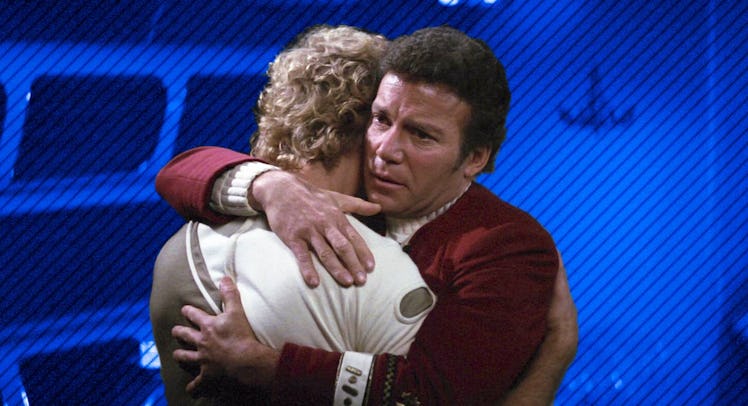‘Wrath of Khan’ Director Says Most Touching ‘Star Trek II’ Scene Was Almost Cut
Nicholas Meyer reveals his fight for a heartfelt moment.

On June 4, 1982, Star Trek II: The Wrath of Khan turned a fledgling sci-fi franchise into an enduring piece of pop culture. The stakes were high for the sequel since the first movie, 1979’s Star Trek: The Motion Picture, was an expensive flop. Wrath of Khan turned it around. “Now this is more like it,” enthused Janet Maslin in her review for The New York Times. So why was The Wrath so damn good? It’s all about one guy, director Nicholas Meyer, who famously rewrote the screenplay in only twelve days, turning a messy sci-fi script into a classic story about friendship, family, aging, and loss. And that was all encapsulated in a memorably tender father-and-son final scene. But, as the writer/director tells Fatherly, the scene almost didn’t make it in.
Why is The Wrath of Khan so emotionally affecting? You might say it has something to do with Ricardo Montalban’s over-the-top performance as Khan or the shocking death of a certain pointy-eared Vulcan hero. None of those assessments would be wrong. But, you’d be forgetting one of the more subtle and affecting stories told: the reunion between interstellar playboy James T. Kirk (William Shatner) and his estranged son, David Marcus (Merritt Butrick).
Because we never knew Captain Kirk had a family in the original series or in the first movie, in Wrath, the backstory of Kirk’s son is explained quickly. Basically, we’re meant to understand that David’s mother, Carol, didn’t want her son traipsing around the cosmos with his father. And so, Kirk and Carol mutually agreed that David would be raised by her, exclusively. And so Kirk jetted off, looking toward the stars ahead but not his family behind.
“Kirk was probably what we would call an absentee father. Both of David’s parents were very career minded,” Meyer tells me. “This aspect of the movie was supposed to be about the reconciliation. It was about the acknowledgment that mistakes may have been made.”
Famously, the biggest twist in The Wrath of Khan was the fact that the movie had the audacity to kill off the most popular Star Trek character of all time, Mr. Spock. Anyone who loves the movie will tell you this is why the movie is so great. But, in the context of the father-son plot, Spock’s death is about David seeing his dad in a different light. “He’s given an opportunity to see aspects of his father’s character. Seeing his father in the context of Spock’s death helps bridge the chasm.”
Much of the success, even according to Meyer, had less to do with the script and more to do with the emotional realism Butrick brought to it. In the final scene, after having gone through an immense ordeal together David tells Kirk that “I’m proud, very proud, to be your son,” resulting in an unforgettable hug.
If you’ve ever wanted to cry during a Star Trek film, this is the one to watch. “By that time, Merritt had risen into the character. And I’m not sure his character was particularly well delineated by me. He did the best with what he had. And what he had got better once he got to cut loose. He saw where the character could go.” And, besides iconic scene of Kirk and Spock in the radiation chamber or Shatner’s famous KHAAAAN yell, this family moment is burned into our memories, too. But, it almost ended up on the cutting room floor.
At the time, CEO of Paramount Pictures Barry Diller, told Meyer that the tender scene between David and Kirk toward the end of the film didn’t work. “He said it didn’t play,” Meyer explains. For his part, Meyer pleaded with Diller to leave it in. “It was a standoff,” he says, “He said his opinion and I said, ‘let’s see.’ We were going to preview the movie.”
“When we previewed the movie, the scene received applause,” Meyer recalls. “So, I got to keep it. And I think it does work. It gives a sense of closure. If that’s not too corny.”
Diller was wrong, Meyer was right. And 36 years after its release, as the credit roll, we still dry our eyes as The Wrath of Khan ends with a burst of love.
This article was originally published on